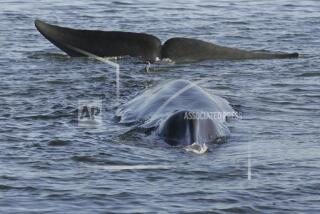Militants Damage Iceland Whale Processing Plants; Official Calls It Terrorism
- Share via
A day after it claimed responsibility for scuttling two of Iceland’s four whaling vessels, a militant environmental group said Monday that its members broke into one of the country’s two whale processing plants and smashed computers and other equipment to protest what they regard as Iceland’s illegal hunting of whales.
Icelandic Foreign Minister Matthias Mathiesen condemned the attacks as acts of terrorism and said his government might invoke international agreements on terrorism against the perpetrators, according to a report from Reykjavik.
“Even if no one was hurt, this amounts to terrorism,” Mathiesen was quoted as telling Icelandic television.
The damage at the privately owned processing plant 15 miles north of Reykjavik, was discovered about 9 a.m. Monday, less than 36 hours after saboteurs opened the underwater valves on two whaling ships docked in Reykjavik harbor, said a spokesman for the Icelandic national police. No one was injured.
The Sea Shepherd Conservation Society, with branches in Los Angeles, Canada and Britain, said Monday that a team that scuttled the 427-ton Hvalur 7 and the 434-ton Hvalur 6 on Sunday morning had smashed the equipment at the whale processing plant a few hours earlier. The plant and ships are owned by Hvalur Ltd..
“Their objective was to cause as much economic damage to the whaling industry as they possibly could” without hurting any people, said Paul Watson, 35, in a telephone interview from his home in Vancouver, Canada. Watson founded the Sea Shepherd Society and is president of its Canadian branch.
Gregar Nordfjord, the police spokesman in Reykjavik, said officials have not yet estimated the loss. Watson put the damage at $5 million--$2 million for each of the ships plus $1 million for the plant.
Attackers Left Iceland
The Sea Shepherd members involved in the attack have left Iceland, Watson said, for an undisclosed destination. They arrived in Reykjavik in late August, he said, and “infiltrated” the Icelandic fishing fleet so “they were able to come and go in that area without arousing suspicion.” Watson refused to say how many people took part in the operation.
Icelandic officials, according to the Reuters news agency, said they have the names of two men suspected of haven taken a part in the sabotage operations. The two left Iceland on Sunday for Luxembourg, they said.
Iceland was targeted, Watson said, because it is violating a worldwide moratorium on commercial whaling that began last Jan. 1. Ordered by the London-based International Whaling Commission, the moratorium is to remain in effect until 1990.
“They’ve thumbed their nose at the IWC. We cannot allow them to wipe the fin whale out of the North Atlantic, especially when they are in contempt of regulations,” Watson said.
However, an official at the Icelandic Embassy in Washington said Monday that his country is observing the moratorium and following commission rules that allow it to hunt whales for scientific research.
Hegli Agustsson, the embassy charge d’affaires, branded Watson’s followers as “criminals.” As for prosecution, Agustsson said, “We are looking at all possibilities.”
Extradition Treaty
Iceland does not have an extradition treaty with Canada, but did sign such a treaty with Britain in 1873, Agustsson said. “We are looking at that,” he added.
Whale research is critical to Iceland’s maritime economy, Agustsson said.
“We live by the sea. And the whale is one of the links in the biological chain of the ocean. We cannot allow anybody to interfere with our legitimate authority over the Iceland economic zone,” Agustsson said.
Hvalur Ltd. vessels, funded through the government research program, have captured slightly fewer than 120 whales so far this year, Agustsson said. Last year, the catch totaled about 400, he said.
Watson and other environmentalists claim that the research is a ruse to disguise continued commercial whaling.
Support for Research
Meat, bones, oils and other byproducts taken from captured whales are processed and sold, Agustsson said, with the proceeds supporting the research program. Until last August, most of the whale meat went to Japan. But after prodding from the United States, which monitors foreign whaling, Iceland in August agreed to keep for domestic consumption slightly more than half of the whale meat.
“What the Icelanders are doing is prostituting science to protect their commercial whaling interests,” Watson said.
A Canadian by birth, Watson founded the Sea Shepherd Conservation Society in 1977, after he was expelled from Greenpeace, a more moderate environmental group, for advocating the use of force against whalers and seal hunters.
With money donated largely by animal welfare groups, including Cleveland Amory’s Fund for Animals and the British Royal Society for the Prevention of Cruelty to Animals, Watson and the society have purchased and outfitted two ships to wage a war against whalers, seal hunters and dolphin killers.
More to Read
Sign up for Essential California
The most important California stories and recommendations in your inbox every morning.
You may occasionally receive promotional content from the Los Angeles Times.













